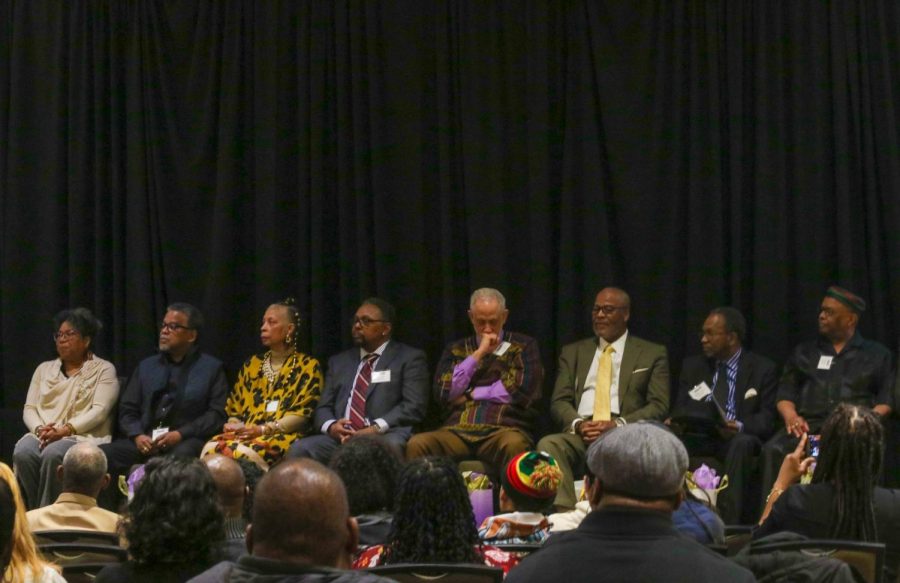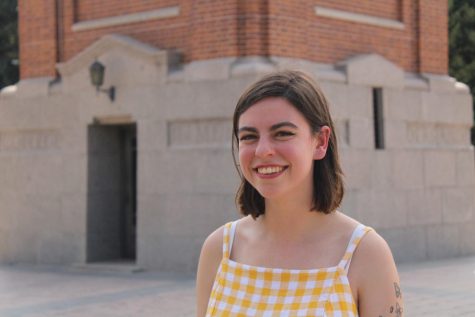UNI Seven honored on 50th anniversary
Members of the UNI Seven racial equality protests of 1970 were honored at a 50th anniversary event on March 9.
Mar 12, 2020
On March 9, the Center for Multicultural Education (CME) honored the 50th Anniversary of the UNI Seven in the Maucker Union Ballrooms. This event helped raise awareness of the events that took place on campus half a century ago when UNI students took action against the administration for failing to welcome the African American community.
In 1969, the UNI Afro-American Society created a proposal to encourage diversity and inclusivity for African American students and faculty. One of the requests within this proposal called for a facility, to be named the Afro-American Cultural Society, to provide representation for African American students. The proposal was initially accepted, but faced intense backlash and anger from the campus community.
“I imagine charges of separatism and reverse discrimination were hurled at these black students who were numerically unable to pose any real threat,” said Reverend Abraham Funchess, Jr., executive director of the Waterloo Commission on Human rights, at Monday’s event. “But the truth is that the academic, intellectual and residential life of these students required them to negotiate and survive in white or integrated settings most of their lives.”
The Afro-American Society created another proposal to require more inclusivity throughout campus. Among the ideas proposed were safe spaces, scholarships and representation in curriculum for minorities. When these demands were ignored, a group of students organized a peaceful sit-in at the president’s house in March 1970 in order to increase awareness of the racism towards Black students and faculty.
The students who began the sit-in stayed overnight at the president’s house and were joined by 22 additional students the following day. This initial protest ended peacefully when the activists decided to leave at the end of the second day.
Despite the peaceful nature of the protest, the UNI administration suspended seven students involved in the protest, resulting in the name of this group: the UNI Seven. After the suspensions, another protest was staged where almost 30 students were arrested.
Ten activists who were involved in the protests were honored at Monday’s anniversary event: Ann Burke, Palmer Byrd, Christopher Dalton, James Johnson, Glen Moore, Terry Sallis, Terry Stevens, Tony Stevens, Joseph Sailor and Byron Washington. Once these activists made their way to the stage, the audience recognized them with a standing ovation.
Dr. Mickye Johnson, director of the Upward Bound program, described the sacrifices made by the UNI Seven and their fellow activists. Several faced imprisonment from the protests, which impacted their financial aid and treatment on campus.
“Your sacrifice did not go unnoticed,” said Johnson, addressing the ten activists present. “You demanded respect and you got it.”
Two years after the 1970 protests, one of the four requests initially made by the Afro-American Society was met. The Vice President’s House on campus was converted into a cultural center called the Ethnic Minority Cultural and Educational Center. This space was later moved into Maucker Union, where it was renamed to become the CME.
Christiana Downey and Alexis Moller, two students on the executive board of the Black Student Union, attended the event because they were interested to hear the stories of those who had fought against the administration and won.
Moller, a sophomore elementary education major, came to the event with the hope of learning more that could allow her to inform others about what has happened on the campus and how knowledge about the past can help fight battles today.
“I was interested because we’re still going through a lot of this stuff,” said Downey, a marketing and business administration major. “[We are] trying to see what exactly they did for change to occur and what influenced the administrators to actually listen. And this is something very important to us as we’re trying to make a change on campus.”
During their return to campus, the ten activists were given the opportunity to see the president’s house and meet with the UNI President Mark Nook.
At Monday night’s event, Nook discussed the visit and informed the audience that the ten had many questions for him. One of the biggest questions they asked was how campus relations had changed.
“The times are not very different in many cases,” Nook said. “There is much work to be done.”








